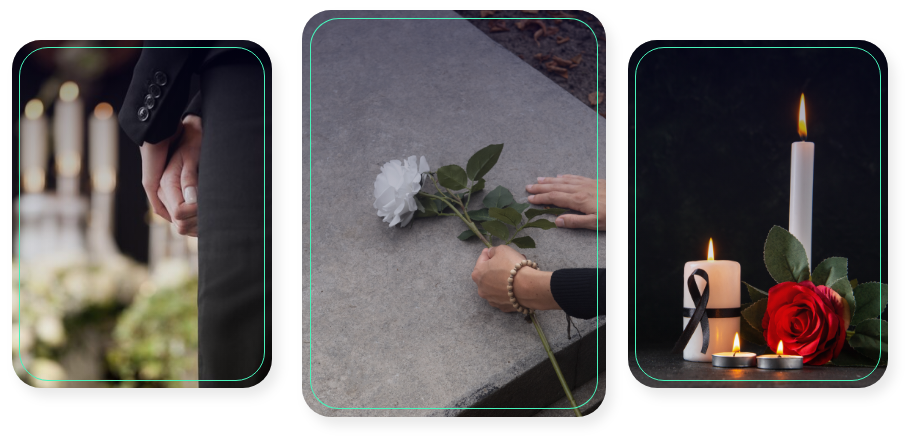How does repatriation work?
What is repatriation? "Repatriation" is the term used when a deceased person is transferred to their country of origin. In these cases, funeral homes are responsible for providing support by liaising with the country's embassy, airlines and coroner's officials on behalf of the family.
How to repatriate a body from the United States?
*Mandatory requirements:
Certificate of Embalming or Cremation duly apostilled or legalized. Transfer permit stating the name, surname and age of the deceased, place and cause of death issued by the competent authority of the country where the death occurred.
Requirements for the transit permit of a body or ashes.
In order to facilitate the transfer or internment of a body or human ashes to Mexico, it is necessary to visa and certify the following documents at the Mexican Consulate corresponding to the domicile of the deceased or the funeral home, to be presented to the Mexican health authorities:

- Death certificate specifying cause of death and correct final destination. If the cause is pending/different, the coroner's letter must be submitted certifying that the death was not caused by contagious disease. (the death certificate must be apostilled). https://www.sos.ca.gov/notary/request-apostille
- International transfer permit issued by the Department of Health, specifying the name and location of the funeral home receiving the body or ashes, or the name and location of the place of final disposition of the body or ashes.
- Certificate of embalming or cremation, signed by the embalmer or crematory, with its license number. If there is an "AKA" (Also Known As) must also appear on the certificate of cremation or embalming.
- In the event that one of the causes of death is COVID-19, se deberá agregar al expediente la técnica embalsamamiento, así como la Carta del Departamento de Salud.
- If the cause of death is Deferred, the Letter from the Medical Examiner's Department must be added to the file.

While repatriation necessarily takes an individual back to his or her territory of origin or citizenship, a return potentially includes taking the person back to the point of departure. This could be to a third country, including a transit country, which is a country through which the person has traveled to reach the country of origin.
of destination. A return could also be within the territorial boundaries of a country, as in the case of returned IDPs and demobilized combatants. The distinction between repatriation and return, voluntary or involuntary, is not always clear.
What are the costs of repatriation of a corpse?
It is relatively common for people to die in places that are not their place of origin. It is unfortunate, yes, but we cannot avoid it. It is therefore of great importance to hire a good death insurance for foreigners when traveling or residing in a foreign country, as it greatly facilitates the repatriation of the body. Only with a death insurance for foreigners the mortal remains of the deceased can be repatriated in a much simpler way, avoiding that the relatives and loved ones of the deceased have to move to the place where their relative has died.
In addition, it should be taken into account that repatriation of the body has an average cost of approximately $5.000 dólares pudiendo ascender a una cifra superior a los $9.000 dólares.
Relocation of family members to a foreign country.
It is very common for family members and relatives of the deceased to wish to travel to the place where the death of their loved one occurred.

Funeral expenses.
These expenses refer to the viewing of the body of the deceased, funeral, burial or cremation or any other service related to the burial of the deceased.
Legal expenses.
Repatriating a corpse is undoubtedly a complex process that must be carried out observing the legislation of both the country where the death occurred and the country of origin of the deceased. This is why administrative and legal advice is required, especially from a professional expert in international law, to guide us through the process.
Repatriation of the body.
It is up to the family to decide whether to repatriate the body of the deceased or not. If they choose the first option, they must present the following documentation to the Spanish Consulate or Embassy in the foreign country of death:
- Letter to the Consul General requesting that he/she authorize the transfer of the body. This letter must state the identity of the deceased, as well as his or her address, and the date, cause and place of death.
- Medical certificate. This will state the cause of death.
- Medical certificate with the embalming procedure that has been carried out.
- Apostilled death certificate.
- Death certificate issued by the Spanish Civil Registry.
- The casket must be composed of two boxes with a series of specific characteristics.
Advantages of having a death insurance policy.
On Death Insurance is intended to cover all expenses related to the death of a person. In addition, in the case of death insurance for foreigners, it will cover the repatriation of the corpse in case of death far from the place of origin. This type of Insurance has a series of advantages. They are the following:
- It is a voluntary insurance that, nevertheless, is taken out by more than half of all Spaniards.
- It provides security for the loved ones, who will not have to deal with all that the repatriation and burial of the deceased may entail.
- The deceased is involved in such a difficult time.
- It covers funeral expenses, which average more than 3,500 euros. To this should be added the expenses
- 6,000 if the deceased died in a foreign country.
- Comprehensive management of the bureaucratic and legal procedures to be carried out after death.
- Repatriation of the corpse.

 Spanish
Spanish English
English
























 Contact Us
Contact Us
 9542973770 - 9548253639
9542973770 - 9548253639